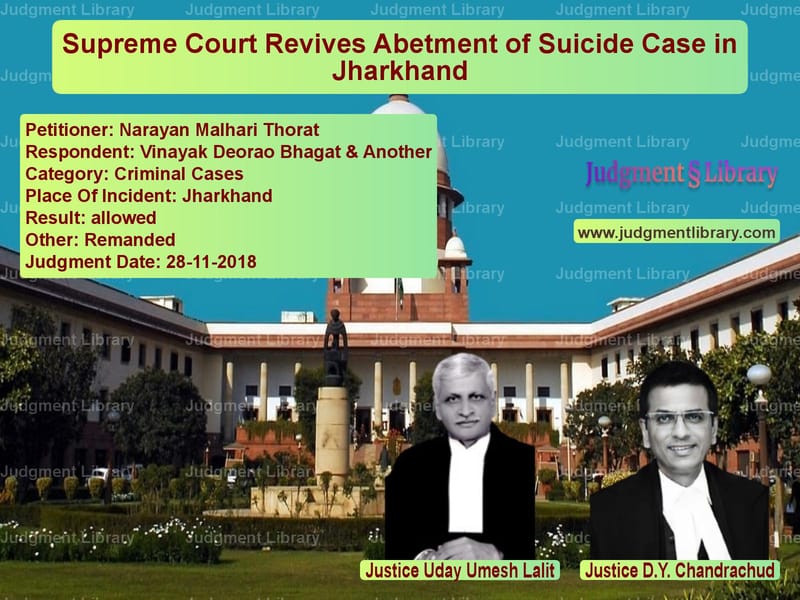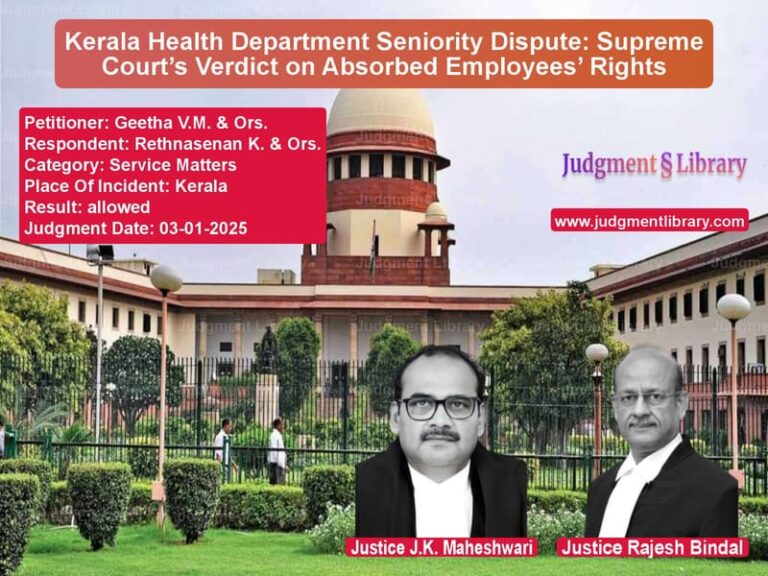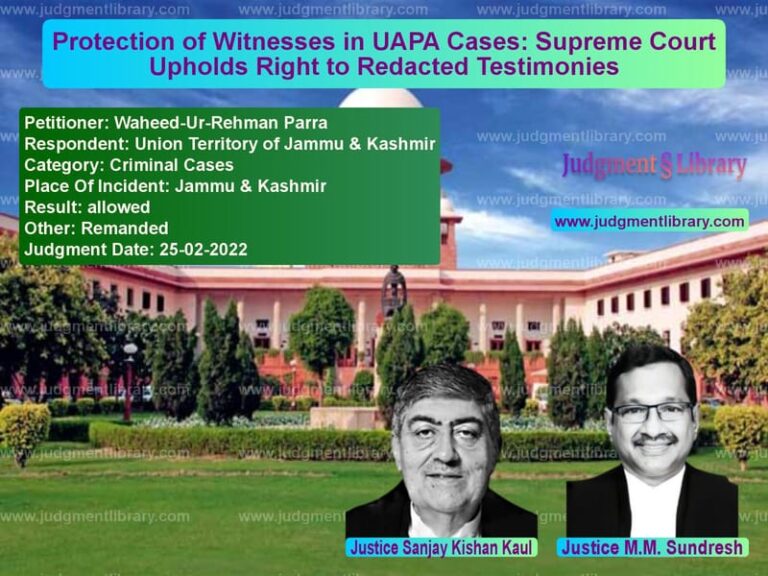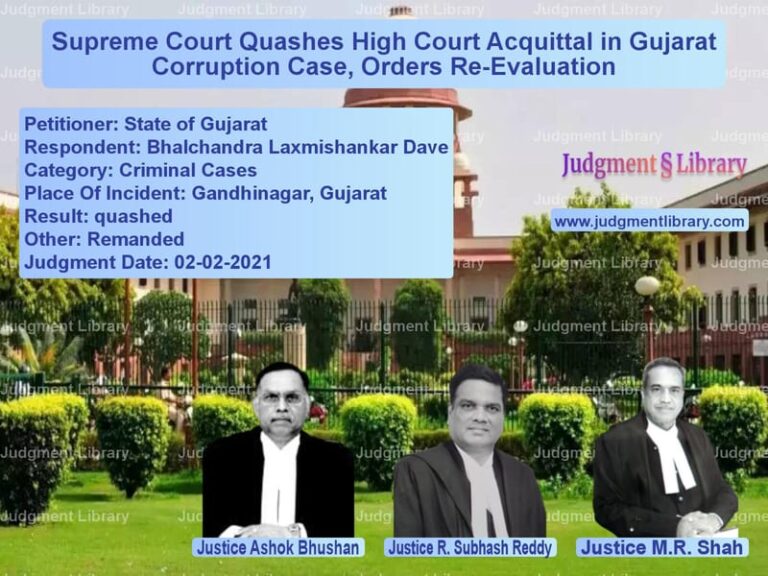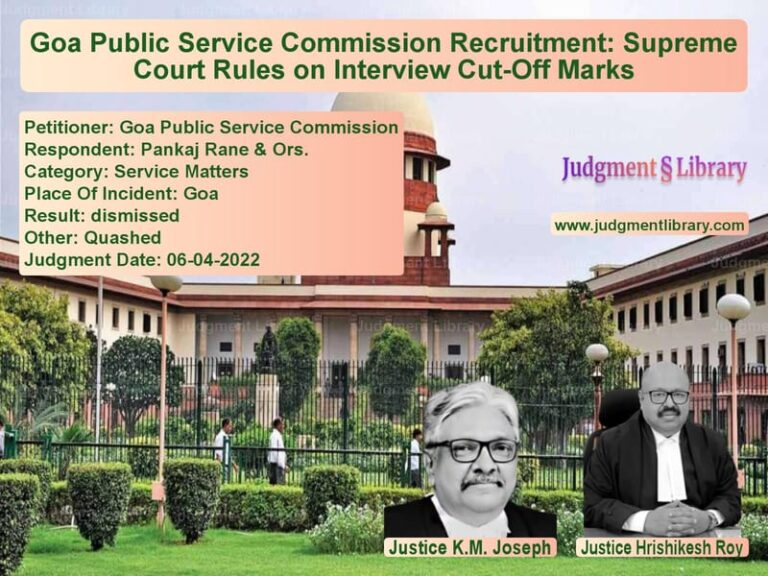Supreme Court Revives Abetment of Suicide Case in Jharkhand
The Supreme Court of India recently ruled in the case of Narayan Malhari Thorat v. Vinayak Deorao Bhagat & Another, setting aside a High Court judgment that had quashed an FIR under Section 306 of the Indian Penal Code (IPC) for abetment of suicide. The case involved allegations of harassment that reportedly led a teacher to take his own life. The Supreme Court emphasized the necessity of a complete investigation before dismissing cases at the preliminary stage.
Background of the Case
The case stemmed from the suicide of Sanjay, a schoolteacher in Jharkhand, on February 12, 2015. A suicide note recovered from his pocket alleged that his colleague, Vinayak Bhagat, had ruined his family life. The deceased’s father, Narayan Malhari Thorat, filed an FIR on February 14, 2015, at Washim Police Station, accusing Bhagat of persistently harassing his daughter-in-law (the deceased’s wife) by repeatedly calling her despite objections.
The respondent, Bhagat, initially sought anticipatory bail, which was rejected by both the Sessions Court on February 21, 2015, and the High Court of Bombay on April 7, 2015. Later, Bhagat approached the High Court under Section 482 of the Cr.P.C., and the FIR was quashed, arguing that there was no evidence of direct abetment. The father of the deceased then appealed this quashing before the Supreme Court.
Legal Issues
- Whether the High Court was justified in quashing the FIR under Section 306 IPC at the preliminary stage.
- Whether there was sufficient evidence to continue the investigation against the accused.
- Whether the suicide note and witness statements provided a prima facie case against the respondent.
Arguments in the Supreme Court
Appellant’s (Petitioner’s) Arguments
- The deceased’s father argued that the respondent had continuously harassed the victim’s wife, leading to the victim’s mental distress and suicide.
- The FIR and witness statements clearly established a pattern of harassment.
- Quashing the FIR without a complete investigation denied the petitioner justice.
Respondent’s (Accused’s) Arguments
- The respondent contended that mere allegations of making phone calls did not amount to abetment of suicide.
- The High Court was correct in observing that there was no direct instigation or active role played by the accused.
- The suicide note did not specifically establish a causal link between the alleged harassment and the suicide.
Supreme Court’s Observations
The Supreme Court disagreed with the High Court’s approach, stating:
“There are definite allegations that the first respondent would keep on calling the wife of the victim and harass her. These allegations are supported by statements of the mother and wife of the victim.”
The Court emphasized that at the FIR stage, the allegations should be investigated rather than dismissed prematurely:
“The High Court ought not to have gone into the aspect of mental element or intention at this stage. The investigation should proceed to establish whether there was abetment.”
Final Judgment
- The Supreme Court set aside the High Court’s judgment and revived the criminal case.
- The authorities were directed to complete the investigation at the earliest.
- The Court clarified that it had not expressed any opinion on the guilt of the accused, leaving the matter open for proper legal proceedings.
Implications of the Judgment
- Judicial Restraint on Quashing FIRs: The ruling reinforces that courts should not prematurely quash FIRs in cases involving abetment of suicide.
- Recognition of Psychological Harassment: The Court acknowledged that persistent harassment, even if indirect, can contribute to severe mental distress.
- Importance of Thorough Investigation: The judgment ensures that law enforcement agencies must complete a fair and detailed investigation before dismissing allegations.
Conclusion
The Supreme Court’s decision in Narayan Malhari Thorat v. Vinayak Deorao Bhagat sets an important precedent for handling cases of abetment of suicide. By reviving the criminal case, the Court emphasized the need for due process and thorough investigation in matters involving mental harassment. The judgment serves as a reminder that courts must exercise caution when quashing FIRs, especially in cases involving allegations of psychological distress leading to suicide.
Petitioner Name: Narayan Malhari Thorat.Respondent Name: Vinayak Deorao Bhagat & Another.Judgment By: Justice Uday Umesh Lalit, Justice D.Y. Chandrachud.Place Of Incident: Jharkhand.Judgment Date: 28-11-2018.
Don’t miss out on the full details! Download the complete judgment in PDF format below and gain valuable insights instantly!
Download Judgment: Narayan Malhari Thor vs Vinayak Deorao Bhaga Supreme Court of India Judgment Dated 28-11-2018.pdf
Direct Downlaod Judgment: Direct downlaod this Judgment
See all petitions in Suicide Cases
See all petitions in Bail and Anticipatory Bail
See all petitions in Judgment by Uday Umesh Lalit
See all petitions in Judgment by Dhananjaya Y Chandrachud
See all petitions in allowed
See all petitions in Remanded
See all petitions in supreme court of India judgments November 2018
See all petitions in 2018 judgments
See all posts in Criminal Cases Category
See all allowed petitions in Criminal Cases Category
See all Dismissed petitions in Criminal Cases Category
See all partially allowed petitions in Criminal Cases Category

